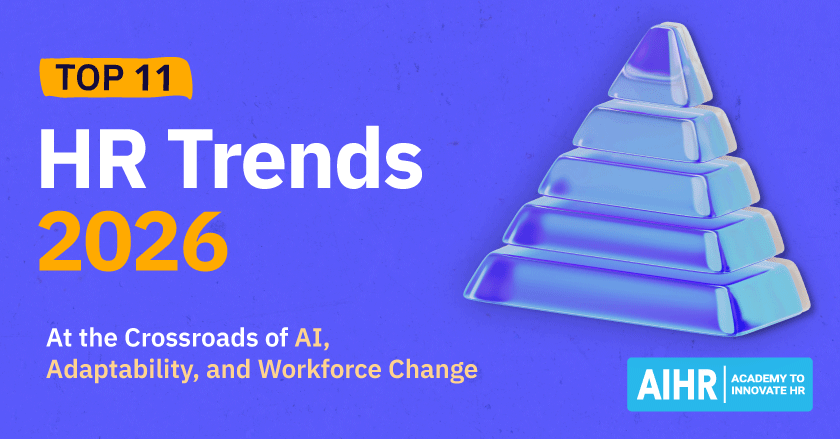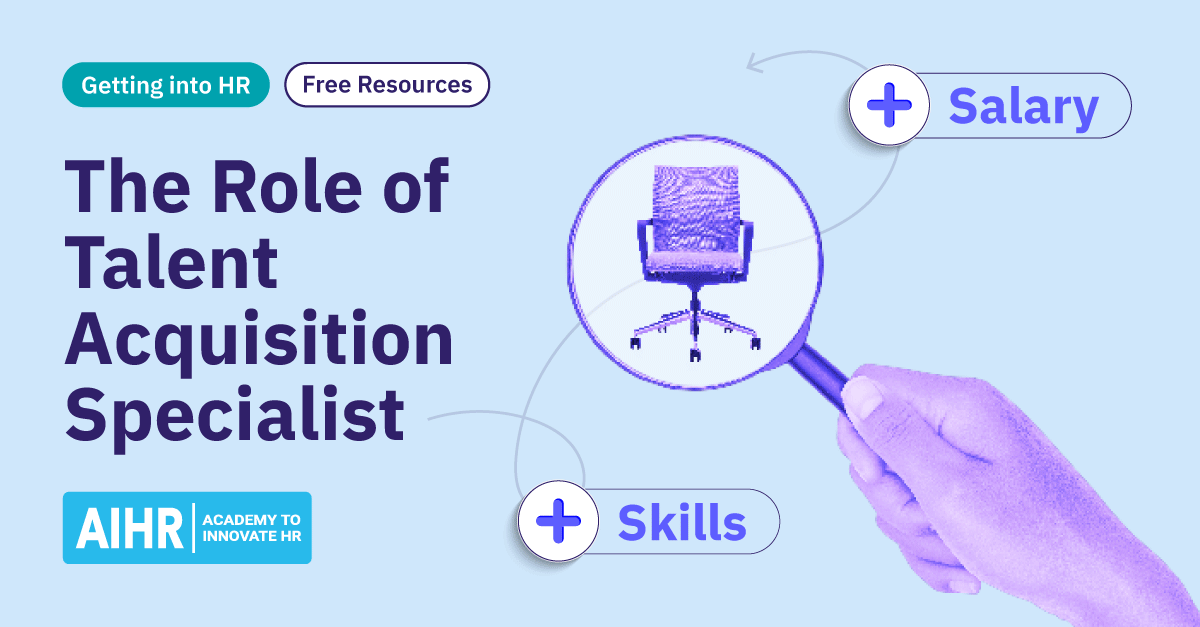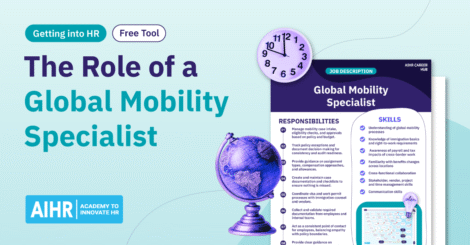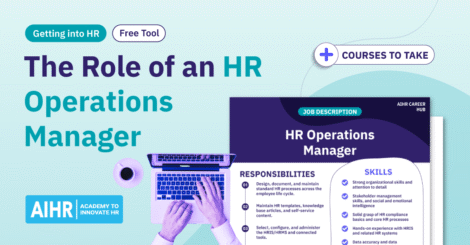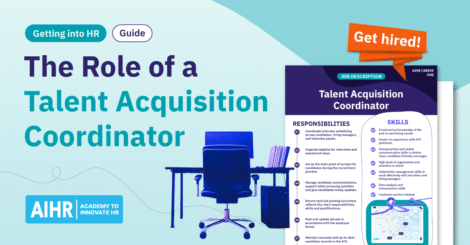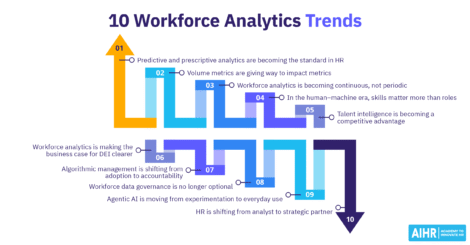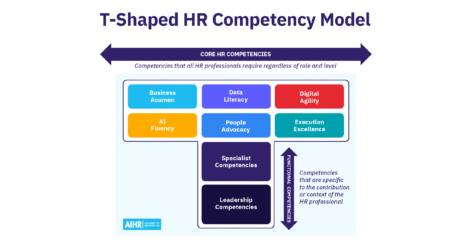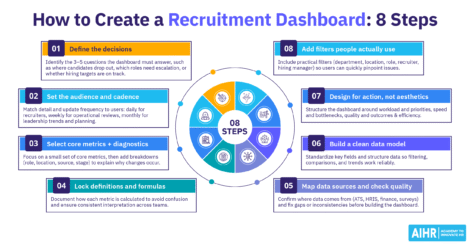A Talent Acquisition Specialist is an HR strategist who helps the business grow sustainably. Pressure is rising — hiring needs are up, but budgets and Recruiter headcount are not. In fact, only 30% of organizations plan to increase talent acquisition (TA) budgets, and just 24% expect to add Recruiters.
TA teams also report a skills shortage (53%) and 56% expect higher hiring demand, making TA Specialists particularly desirable. This article covers the role’s responsibilities, required skills, and potential career paths for a TA Specialist.
Contents
What is a Talent Acquisition Specialist?
Talent Acquisition Specialist job description
Roles and responsibilities of a Talent Acquisition Specialist
Qualifications for a Talent Acquisition Specialist role
Skills and competencies for a Talent Acquisition Specialist role
Average Talent Acquisition Specialist salary
Potential career path for a Talent Acquisition Specialist
AIHR certificate programs to take
Key takeaways
- Talent acquisition should be considered a strategic driver of growth, not a back-office task.
- Rising hiring demand amid flat budgets and headcount make pipelines and quality hires especially important.
- Data, structured selection, and human-led AI can boost efficiency and fairness.
- Those aspiring to senior TA roles must upskill in sourcing, analytics, and stakeholder management.
What is a Talent Acquisition Specialist?
The Talent Acquisition Specialist is a strategic HR role focused on finding, attracting, and hiring the right people. They collaborate with Hiring Managers, HR, and leadership teams to forecast and address workforce requirements. Their goal is to help fill critical roles efficiently. They may be directly employed, or support various clients through staffing and RPO agencies.
From sourcing passive talent to negotiating job offers, TA Specialists handle every aspect of the recruitment process. They may also act as candidate advocates and brand ambassadors for their companies. They do so by providing a positive candidate experience that reflects their organizations’ values.
Talent Acquisition Specialist job description
A TA Specialist manages end-to-end hiring, partnering with managers on role design and strategy, building pipelines, and fair, structured selection. They advise on pay, time to hire and talent supply, keep ATS data clean, report results, and ensure compliance. The role is most common in mid-sized to large firms, and most sought-after in tech, healthcare, and finance.
Roles and responsibilities of a Talent Acquisition Specialist
Here are the roles and responsibilities of a Talent Acquisition Specialist:
- Conduct role kick-off/intake meetings and align on hiring criteria.
- Write inclusive, clear job descriptions, post to targeted channels, and source passive candidates (Boolean search, social, talent communities).
- Build long-term relationships with silver-medalist candidates and alumni networks for future roles.
- Screen résumés and conduct structured phone/video screens, and administer skills tests or work samples where relevant.
- Coordinate interviews and train Hiring Managers on structured interviewing.
- Manage candidate communications and feedback loops to reduce drop-off.
- Partner with HR/C&B to create competitive, equitable offers.
- Track and improve funnel metrics (e.g., time to hire, cost per hire, quality of hire).
- Maintain compliance with local, state, and federal employment laws.
- Work within hiring budgets and balance sourcing costs with talent quality.
- Support DEIB goals via inclusive sourcing and unbiased selection practices.
- Work with workforce planners to anticipate hiring needs six to 12 months in advance.
- Gather Hiring Manager and interview feedback to inform improvements.
- Represent the company at job fairs, campus recruiting, and industry events to attract top talent.
- Use HR AI tools and recruitment platforms to improve sourcing accuracy and improve the candidate experience.
- Provide insights on competitor hiring practices, salary benchmarking, and talent availability
- Respond quickly during unexpected talent shortages, hiring freezes, or periods of rapid growth.
- Provide regular hiring updates and metrics to executives and leadership teams.
HR case study
Mastercard once struggled with a fragmented candidate experience, thanks to its 100-plus career sites worldwide, resulting in inconsistency, inefficiency, and missed opportunities to engage talent. To address this, the company consolidated all sites into a unified careers platform. It also automated interview scheduling to save Recruiters’ time.
In addition, it built a global talent community that quickly grew to 900,000 members. It subsequently saw a 900% increase in candidate profiles, and scheduled interviews 85% faster.
For TA Specialists, streamlining processes and proactively engaging candidates creates real business impact. By improving efficiency and building long-term talent pipelines, they can deliver measurable value not only to HR but also the whole organization.
Qualifications for a Talent Acquisition Specialist role
To succeed as a TA Specialist, candidates need the right mix of education, certifications, and experience.
Educational requirements
Here are the minimum educational requirements for becoming a Talent Acquisition Specialist in the U.S.:
- Bachelor’s degree in HR, Business, Psychology, Communications, or related field
- A master’s degree in HR or Organizational Psychology is a plus for senior roles.
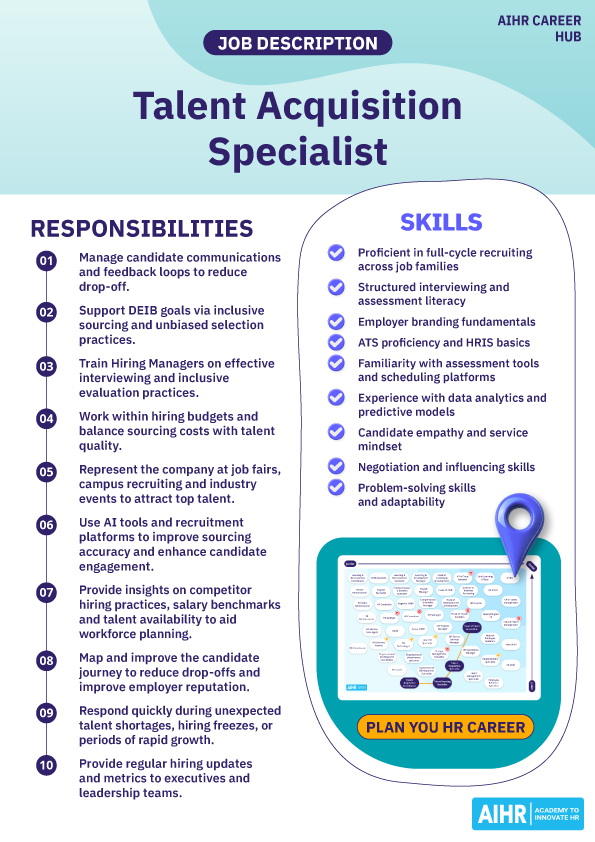
Recommended certifications
Although optional, relevant certifications within the Talent Acquisition field can help advance your career. Here are some popular certifications:
- SHRM-CP or SHRM-SCP: The SHRM-CP is offered to experienced HR professionals, while the SHRM-SCP targets HR leaders and professionals in strategic, senior-level positions.
- HRCI PHR or SPHR: The PHR course is geared towards early to mid-career HR personnel, while SPHR is targeted for experienced HR professionals.
- PRC (AIRS): This course is designed for entry- to mid-level HR and recruiting professionals. It’s also suitasble for those without formal HR experience and want a recognized certification in Recruitment.
- LinkedIn Recruiting Professional Certificate: Ideal for people who are just starting in HR, those who want to switch to an HR career, or who wish to review HR fundamentals.
Work experience
While organizations and industries vary, here’s the experience you will generally need to be considered for a TA Specialist job:
- Entry level: One to two years as a Recruiting Coordinator, or in sourcing or HR support. They often start by handling scheduling, initial screenings, and candidate communication to support senior Recruiters.
- Mid-level: Three to five years in full-cycle recruiting (preferably in-house). They would have partnered directly with Hiring Managers, and may have also begun to develop niche expertise in a specific function or industry, such as sales, recruiting, or tech recruiting.
- Senior: Five to eight or more years, including specialty recruiting or lead responsibilities. They may have experience mentoring junior recruiters or managing high-priority talent.
Master talent acquisition to drive long-term retention
To maximize employee retention through TA, you must align hiring with business goals, use data and structured selection to hire for skills and culture add, and communicate transparently.
✅ Align your TA practices with HR practices and organizational strategy
✅ Build an effective TA strategy to attract top talent for critical vacancies
✅ Meet organizational talent needs with a robust pipeline of best-fit talent
✅ Define talent competencies and create solid succession planning
Learn at your own pace with the online Strategic Talent Acquisition Certificate Program.
Skills and competencies for a Talent Acquisition Specialist role
Let’s explore the specific skills and competencies required of a Talent Acquisition Specialist.
Role-specific skills
- Proficient in full-cycle recruiting across job families (e.g., sales, ops, technical)
- Strong sourcing methods (Boolean search, social recruiting, referral programs)
- Structured interviewing and talent assessment literacy
- Understanding of employer branding strategy (EVP, job ads, campaigns)
- Offer management and closing strategies
- Talent pipeline management with proactive talent pooling and re-engagement strategies
- Understanding of compliance requirements related to data privacy, anti-discrimination laws, and global labor regulations
- Ability to create compelling recruitment content for social media to boost employer branding and candidate engagement.
Technical skills
- Proficiency in ATS (e.g., Greenhouse, Workday, Lever) and job board tools
- Knowledge of HRIS basics for handoff to onboarding/payroll
- Data analysis skills for recruiting metrics and dashboards (Excel/Sheets, data hygiene basics)
- Familiarity with assessment tools and scheduling platforms
- Ability to use AI-powered sourcing and screening tools
- Experience with recruitment marketing platforms and basic understanding of SEO for job postings
- Experience with data analytics and predictive models.
Soft skills
- Clear communication and stakeholder management skills
- Candidate empathy and service mindset
- Organization and time management in a high-volume environment
- Negotiation and influencing skills
- Problem-solving and adaptability in changing labor markets
- Collaborative mindset aligned with Diversity, Equity, Inclusion, and Belonging (DEIB) goals.
HR tip
Don’t just track recruiting metrics, but also use them to guide decisions. For example, if your funnel shows high drop-off after the first interview, investigate whether the job description is clear enough or if your interview process needs improvement.
Average Talent Acquisition Specialist salary
The salary of a Talent Acquisition Specialist depends on various factors, including years of experience, education, industry, and qualifications.
Indeed estimates the average annual salary of a senior TA Specialist in the U.S. to be around $105,334. According to Glassdoor, this figure is approximately $101,000 across all industries. Meanwhile, Payscale lists the average TA specialist salary as $65,660 per year, while on ZipRecruiter, the average salary is stated as $62,876 per year.
Potential career path of a Talent Acquisition Specialist
TA professionals enter the field as Talent Acquisition Coordinators. During this time, they learn the fundamentals of scheduling, applicant tracking systems, and pipeline management. These activities are in preparation for full-cycle recruiting.
As they progress, coordinators can advance to a TA Specialist, Talent Sourcing Specialist (or Talent Sourcer), or even a Recruiter position. In this position, they manage the end-to-end hiring process, striking a balance between candidate advocacy and business needs. They also develop advanced sourcing, assessment, and stakeholder management skills.
Ultimately, the career path may culminate in leadership roles such as Head of Talent Acquisition. At this point, they design enterprise-wide and long-term workforce strategies. They also lead recruitment teams at scale, blending strategy, leadership, and business partnership at the executive level.
AIHR certificate programs to take
AIHR offers four self-paced online certificate programs to help TA Specialists strengthen their technical and strategic skills.
Strategic Talent Acquisition Certificate Program
The Strategic Talent Acquisition Certificate Program will help you align hiring goals with business outcomes and build consistent pipelines. You’ll gain frameworks to develop your own talent acquisition strategy, structure your employer brand (EVP), and improve candidate experience.
People Analytics Certificate Program
The People Analytics Certificate Program teaches recruitment analytics to help you improve your sourcing and screening processes. The program will help you gain the insights you need to transform ATS data into recruitment action plans, and solve people challenges for various stakeholders.
Diversity, Equity, Inclusion & Belonging Certificate Program
The Diversity, Equity, Inclusion & Belonging Certificate Program provides the tools and resources necessary to implement an inclusive hiring process. You’ll learn how to identify and remove bias, design equitable processes, and build a workplace that fosters a sense of belonging.
HR Business Partner 2.0 Certificate Program
The HR Business Partner 2.0 Certificate Program will help you transition from being a Recruiter to a strategic HR Business Partner (HRBP) by teaching business acumen, data literacy, and consulting skills. You’ll also learn to influence stakeholders and lead cross-functional talent initiatives.
Next steps
Treat talent acquisition as a strategic lever. Hiring demand is outpacing budgets and headcount, so build pipelines, shorten time to hire, and raise quality without sacrificing fairness or candidate experience. You can also use AI to scale, but maintain human intervention throughout to avoid bias and a cold process.
Additionally, grow your impact — and career — by mastering sourcing, analytics, and stakeholder management. Aim for senior, and upskill with focused programs in strategic TA, people analytics, DEIB, and HR business partnering to advance and future-proof your HR career.


